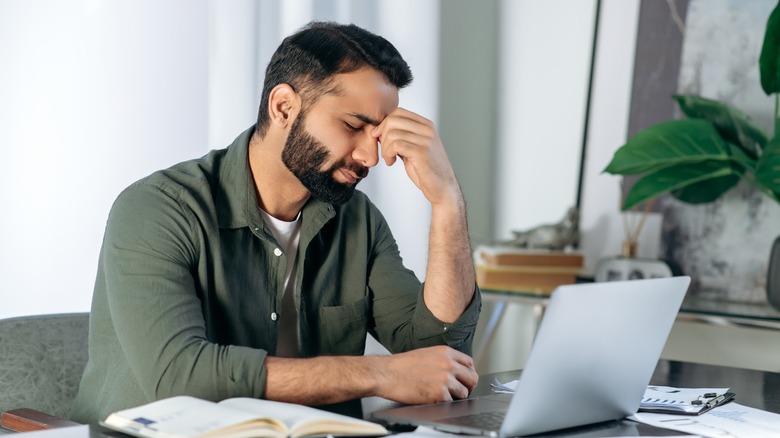How To Prevent Thirst Headaches
Whether it's from stress or lack of eating from time to time, we all get headaches. While experiencing a headache, most people encounter a consistent throbbing pain in their head or face, as per the Cleveland Clinic. However, there are many different types of headaches, which can be identified by the location and type of pain, according to Healthline.
Oftentimes, thirst headaches feel like an aching feeling spread across your forehead (per Livestrong). Similar to tension headaches, thirst headaches can be caused by dehydration, a condition that occurs when you don't drink enough fluids. However, along with dehydration, water-deprived head pains may also result in feeling lightheaded, irritable, and fatigued. Interestingly, experts don't exactly know why dehydration causes headaches since the brain does not have pain receptors, according to Harvard Health Publishing. It's believed one's meninges, the lining surrounding the brain, can be thrown off balance when someone isn't consuming enough water, which results in head pains. Nevertheless, we do know how to prevent thirst headaches.
Stay hydrated to avoid thirst headaches
Luckily, avoiding a thirst headache, or getting rid of one, is as simple as staying hydrated (per the National Headache Foundation). However, it's important to understand that if you drink plenty of water and are still getting thirst headaches, it's best to speak with your primary care physician, according to Livestrong.
If you feel a thirst headache coming on, drink 16 to 32 ounces of water (via Harvard Health Publishing). However, drink more water if you are severely dehydrated to help the pain go away. Staying hydrated is essential, especially if you're exercising. Experts from MHealthy Physical Activity Program at the University of Michigan recommend staying hydrated before, during, and after working out. In fact, it's best to consume 7-10 ounces of water during 10 to 20 minutes of physical activity.
Lastly, don't wait until you're thirsty to drink water. Many people assume that they don't need to drink until they're thirsty but thirst is actually one of the first signs of dehydration. Therefore, drink plenty of water throughout the day, especially during the summer.


